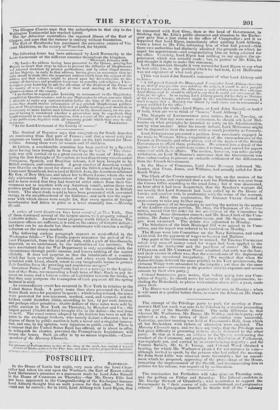POSTSCRIPT.
SATURDAY.
In the House of Lords last night, very soon after the Lord Chan- cellor had taken his seat upon the Woolsack, the Earl of RIPON called Lord Melbourne's attention to a statement made by Lord John Russell In the House of Commons on Thursday—that Mr. Henry Ellis had not been appointed to the Comptrollership of the Exchequer because Lord Althorp thought him an unfit person for that office. Now this could not be correct ; for in 1833, Lord Althorp told Lord Ripon, that
he concurred with Earl Grey, then at the head of Government, in thinking that Mr. Ellis's public character and situation in the Exche- quer gave him a just claim to the office of Comptroller ; and it so happened that Lord Ripon, immediately after quitting Lord Althorp, wrote a letter to Mr. Ellis, informing him of what had passed—that these two authorities had distinctly admitted the grounds on which he urged his appointment—and congratulating him on being selected for the office. Certainly, Lord Ripon had nothing to say against the ap- pointment which was actually made ; but, in justice to Mr. Ellis, he had thought it right to make this statement.
Lord MELBOURNE thought it very natural for Lord Ripon to say what he had said ; but, in the position which he had held, Lord Melbourne was not cognizant of what took place.
[This was Lord Juhn Russell's statement of what Lord Althorp said to him- " A bill passed tkronsh the House, and I remember Lord Althorp obserring to me, that if air!/ VICSI;011 mere asal on the melded, it would he most painful to hint to answer it, because _lb.. 15.08 a near reinsure to our then colleague Lord Ripon, and he should be obliged to say tint he could not recommend .1Ir. Ellis fir the tgliee. Iii so saying, Lori: .11tholp purely (lid his duty as Minister of the CrOW/1; because, whatever might be the considerations of economy, I don't imagine that a Minister was bound by such views nut to recommend a person qualified for the office."
Who speaks the truth—Lord Ripon, or Lord John Russell, or both? if both, what are we to think of "honest" Lord Althorp:]
The Marquis of LONDONDERRY gave notice, that on Tuesday, or Thursday if that day were more convenient, he should ask Lord Mel- bourne on what principles he intended to carry on his Administration, and by what means? After Isis recent defeats, Lord Melbourne might not be disposed to treat the matter with as much jocularity as formerly.
Lord STRANGIORD presented a petition from merchants engaged in the trade to Western Africa, complaining of the encroachments of the French at Portendic and other places, and of the neglect of the British Government to afford them protection. lie entered` ntered into a detail of the injuries fie• which the petitioners claimed redress, and moved for papers connected with these affairs. The motion, however, was subsequently withdrawn, on Lord Melbourne's assurance that the Government was then endeavouring to procure an amicable settlement of the differences from the French 'Government.
In the House of Commons, Lord Joux Messmer. informed Mr. Leader, that Frost, Jones, and Williams, had actually sailed for New South Wales.
The Clerk of the Crown appeared at the bar, on the motion of Sir GEORGE Cosnue, and explained that a writ for Perthshire was sent from the Crown Office according to the usual form ; but it was discovered, an hour after it had been despatched, that the Speaker's warrant did not specify that Lord Stormont had been called up to the House of Lords ; and another writ, in conformity with the terms of the warrant, was sent. After this explanation, Sir GEORGE CLERK deemed it unnecessary to take any further steps. In consequence of an irregularity in serving the notices in the matter of the Ludlow election petition, Mr. OM); the Chairman of the Com- mittee, moved that the order for the attendance of the Committee be discharged. Some discussion ensued; and Mr. Rose, Clerk of the Com- mittee, Mr. James Coppock, election-egent, and Mr. Steyne, messen- ger, were examined. The debate wae adjourned to Monday.
The Schedules of the Irish Municipal Bill were agreed to in Com- mittee, and the report was ordered to be received on Monday.
The House wait into Committee on the Navy Estimates, and voted 1,142,5041. for the payment of wages to Besides amid Marines. One point of the discussion must be noticed. Sir THOMAS COCHRANE asked why autos of money voted for wages had been applied to the service of the dockyards and the purchase of stores? Mr. MORE OTERRALL and Mr. CHARLES Woon admitted that such was the fact ; and their excuse in effect was, that the convenience of the department required the occasional irregularity. [We recollect that when Sir James Graham detected the same practice in his Tory predecessors, the virtuous Whigs were astounded by the iniquity ; yet they do the same themselves now—persevere in the practice after its exposure and severe censure by their own party.] Colonel SIBTHORPE gave notice, that before going into any Com- mittee of Supply, he should move for returns of all appointments, in- cluding the Household, to places with salaries aboec 200!. a year, made since 1830.
The House was adjourned at a quarter before one, to Monday ; when it will meet at a quarter before three, to renew the debate on Mr. ORD'S 1110Ii011.


























 Previous page
Previous page